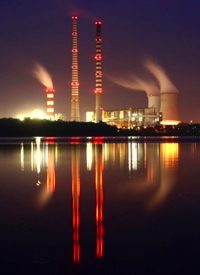
"Right now there are no limits to the amount of carbon pollution that future power plants will be able to put into our skies — and the health and economic threats of a changing climate continue to grow," asserted Lisa Jackson, chief administrator at the Environmental Protection Agency.
Environmentalists, Democratic lawmakers, and other policy advocates say the measure simply grounds the natural market forces that currently favor the development of natural gas facilities. "It shows that the future of electricity is in adopting low polluting, climate smart technologies," averred Joe Mendelson, the director of global warming policy at the National Wildlife Federation.
Added David Doniger, an attorney for the Natural Resources Defense Council: The regulation "reinforces what most power company executives and investors already understand — that if and when new coal plants make a comeback, they will need to be designed with carbon capture and storage."
But Republican lawmakers and industry leaders differ, arguing that economic dormancy and high unemployment levels are already making utility bills a heavy financial burden. "Despite an economic recession, an unacceptable unemployment rate and families that are struggling against escalating energy costs, the EPA is once again pushing for expensive new rules," Evan Tracey of the American Coalition for Clean Coal Electricity (ACCCE), said last month.
CEO of ACCCE Steve Miller predicts an industrial apocalypse for new coal development, saying the rule "will make it impossible to build any new coal-fueled power plants and could cause the premature closure of many more coal-fueled power plants operating today."
The EPA under Obama’s tenure has been, simply put, a coal-killer. And the President’s perception of the coal industry is explicit, as rendered to the San Francisco Chronicle in a January 2008 interview:
I was the first to call for a 100% auction on the cap and trade system, which means that every unit of carbon or greenhouse gases emitted would be charged to the polluter. That will create a market in which whatever technologies are out there that are being presented, whatever power plants that are being built, that they would have to meet the rigors of that market and the ratcheted down caps that are being placed, imposed every year.
So if somebody wants to build a coal-powered plant, they can; it's just that it will bankrupt them because they're going to be charged a huge sum for all that greenhouse gas that's being emitted.
The EPA rule proposed Tuesday adds to a catalog of other regulations imposed by the Obama administration, including one that aims to abate air pollution in states downwind from pollutant-heavy power plants; and another that imposes the first standards on mercury and other pollutants from plant smokestacks.
Surveys and other analyses have indicated that such regulations will devastate the coal industry. For example, a survey conducted by the Associated Press found that more than 32 power plants across the United States will be forced to shut down, largely due to onerous new EPA regulations. Those plants, which are mostly coal-fired, generate enough electricity to power more than 22 million households, and their closure will pave the way for job layoffs, depleted tax revenues, and a steep jump in electric bills. In total, the rules could liquidate more than eight percent of coal-generated energy nationwide.
As The New American previously reported, Arizona’s largest utility announced that it will be retiring three of five generating units in 2013, which company officials largely attribute to the EPA’s mercury rule. The 2,040-megawatt Four Corners Power Plant — the largest in the United States — currently provides electricity to some 300,000 households in Texas, California, Arizona, and New Mexico.
Furthermore, many city budgets, particularly in areas where utilities are prominent economic-drivers, will likely be faced with further slumps in revenue. Government officials in Salem, Massachusetts, for instance, are scurrying to find new revenue sources as the city’s coal- and oil-fired power station begins closing its doors, weeding out Salem’s largest taxpayer. Due to the station’s closure, Salem will lose nearly $5 million of its $70 million in annual tax revenues.
"When you take a large chunk of tax revenues like that out of the revenue stream coming into the city, it has an impact if we have to make it up on the backs of other taxpayers," Salem Mayor Kimberley Driscoll lamented. "And 85 percent of our taxpayers are residents, so you are talking mostly residential home owners who are feeling struggles and [are] strapped already in meeting their tax obligations."
In the end, the regulatory burden imperils just about everyone, reported the Washington Times in a recent editorial:
The genius of the free market is that it provides consumers with more for less. That principle is turned on its head in the Obama era, as Americans face the prospect of getting less for more when it comes to powering their homes and workplaces. In a poor economy, that’s bad news for folks who’ve already tightened their belts to the final hole.
While the latest EPA rule will grandfather those plants already in operation, it will supremely reduce the construction of new facilities — in effect, "complementing" the previous regulations that do apply to existing coal-fired plants. Responding to Tuesday’s announcement, Luke Popovich, spokesman for the National Mining Association, warned, "It is virtually calculated to drive coal, a very, very affordable generator of electricity, out of the U.S. electricity market."



